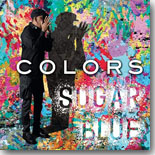 If
you’re old enough to remember the Rolling
Stones’ mid-’70s disco smash, “Miss You,” you
probably remember the distinctive, piercing
harmonica that wove through the track (and
several others on the accompanying Stones album, Some Girls). That harmonica was
played by Sugar Blue, who was busking on
the streets of Paris when he happened to meet
Mick Jagger. Previously, he had appeared on
sessions with Johnny Shines (Too Wet To Plow),
Roosevelt Sykes, and Louisiana Red, but the
exposure via the Stones launched him on a solo
career (check out his excellent 1994 release
Blue Blazes on Alligator Records) in
addition to continued session work, including a
stint with Willie Dixon’s Chicago Blues All
Stars.
If
you’re old enough to remember the Rolling
Stones’ mid-’70s disco smash, “Miss You,” you
probably remember the distinctive, piercing
harmonica that wove through the track (and
several others on the accompanying Stones album, Some Girls). That harmonica was
played by Sugar Blue, who was busking on
the streets of Paris when he happened to meet
Mick Jagger. Previously, he had appeared on
sessions with Johnny Shines (Too Wet To Plow),
Roosevelt Sykes, and Louisiana Red, but the
exposure via the Stones launched him on a solo
career (check out his excellent 1994 release
Blue Blazes on Alligator Records) in
addition to continued session work, including a
stint with Willie Dixon’s Chicago Blues All
Stars.
I’ve not heard all of Sugar Blue’s recent recordings,
but his latest, Colors (Beeble Music LLC) is as good, maybe
better than Blue Blazes. It’s certainly a wider-ranging
collection of songs as befits Sugar Blue’s restless musical approach.
Songs from the album were recorded in Chicago, Shanghai, Milan, and
Johannesburg, with a host of guest musicians from around the world
sitting in.
The opener, “And The Devil Too,” pays tribute to Bo
Diddley with that irresistible beat and a triple guitar attack from Rico
McFarland and guests Nick Tremulis and Rick Barnes. Meanwhile, Blue’s
harmonica weaves and screams in, out, and around.
“Bass Reeves” is an entertaining ballad about a
liberated slave who became the first black Deputy U.S. Marshal in the
Old West days (and who was reportedly the inspiration for the Lone
Ranger character). The moving “We’ll Be Allright” is a message of hope
that features a young choir from Soweto, South Africa, Afrika Riz, and
deft keyboard accompaniment from Damiano Della Torre. If you’re a fan of
the Stones, you’re probably familiar with The Beatles’ “Day Tripper,”
but probably not so much with Sugar Blue’s impressive rendition, which
picks up the pace considerably from the original and funks it up big
time (thanks, in part, to Chicago bass-playing legend Johnny B. Gayden’s
presence).
"Good Old Days” is an acoustic country blues where Blue
points out that while those days might have been “good for you” they
were “not for me and mine.” The gritty “Man Like Me” is a modern update
on the traditional blues theme of advanced sexual skills, and “Dirty Ole
Man” is a hilarious follow-up that brings the sexual prowess theme
crashing back to earth. “Shanghai Sunrise” is a smooth and soulful,
almost jazzy look at the city (Ling Bo guests on the sheng, an ancient
Chinese reed instrument that was a precursor to the harmonica.
The cautionary tale, “Downhill,” simmers and percolates
with funk (coinciding with another guest appearance from Mr. Gayden on
bass), and the acoustic “Bonnie and Clyde” recounts the story of the
legendary outlaw duo. The album closes with “Keep On,” a mellow tune
promising better days ahead.
On second thought, maybe Colors is Sugar Blue’s
best release to date. Certainly, it demonstrates his broad range of
musical influences, as well as some first-rate songwriting, singing,
and, of course, his masterful harmonica skills.
--- Graham Clarke
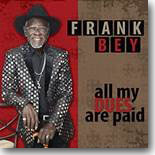 Frank
Bey passed away in June after a long battle
with kidney failure and other ailments, but with
his final release, All My Dues Are Paid
(Nola Blue Records), he left blues and soul fans
with a real gem. Blessed with a distinctive and
strong baritone voice that was a snug fit for
blues, soul, gospel, and funk, Bey shines on
these 11 surprisingly diverse selections, giving
them his own unique spin in collaboration with
producers Kid Andersen and Rick Estrin and a
host of stellar musicians providing excellent
support.
Frank
Bey passed away in June after a long battle
with kidney failure and other ailments, but with
his final release, All My Dues Are Paid
(Nola Blue Records), he left blues and soul fans
with a real gem. Blessed with a distinctive and
strong baritone voice that was a snug fit for
blues, soul, gospel, and funk, Bey shines on
these 11 surprisingly diverse selections, giving
them his own unique spin in collaboration with
producers Kid Andersen and Rick Estrin and a
host of stellar musicians providing excellent
support.
Bey opens with a blistering cover of Eddie
Palmieri and Harlem River Drive’s “Idle Hands”
that ably reflects his deep roots in funk
(dating to the early ’70s with the band Moorish
Vanguard). “One Of These Days” is a nice and
easy slice of southern soul with a shot of B3
and Wurlitzer from Jim Pugh, and Estrin’s
swinging “Calling All Fools” is a lot of fun,
while Mighty Mike Schermer’s “It’s A Pleasure”
is greasy R&B with The Sons Of The Soul Revivers
adding gospel-flavored backing vocals.
Meanwhile, the funky title track (co-written by
Bey, Estrin, Andersen, and Kathy Murray) tells
of Bey’s determination to overcome the numerous
obstacles along the way during his life.
Bey nails the George Jones classic, “He Stopped
Loving Her Today,” transforming it into a
country soul masterpiece with his sincere,
heartfelt vocal. Another Estrin cover, the
smoky, after-hours “I’ll Bet I Never Cross Your
Mind,” marries blues and jazz. The raucous
“Never No More” is the first of two consecutive
Percy Mayfield covers, with the second being the
tasty “Ha Ha In The Daytime,” a relaxed track
that certainly doesn’t deserve its relative
obscurity. One of my favorite tracks on the disc
is Bey’s marvelous reading of the late country
soul master Arthur Alexander’s “If It’s Really
Got To Be This Way,” one of my favorite tunes.
I was surprised to hear Bey’s cover of Lou
Reed’s “Perfect Day," as it’s not often that one
hears a Lou Reed song on a blues album. Bey’s
treatment (with vocal assistance from Lisa
Leuschner Andersen) is excellent. The gospel
feel continues through the final two tracks,
Schermer’s lively “One Thing Every Day,” which
encourages everyone to maintain a positive
outlook, and finally, John Lennon’s “Imagine.”
Happily, Frank Bey got to enjoy some of the
accolades lavished upon All My Dues Are Paid
before passing away. Also happily, he left us
with his best recording before he departed this
mortal coil.
--- Graham Clarke
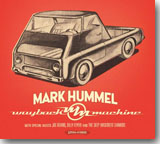 Mark Hummel’s latest release is called
Wayback Machine (Electro-Fi Records) for a
good reason. The harmonica ace takes listeners
way back beyond the heyday of Chicago blues
(circa 1950s Chess/VeeJay Records) to the
preceding era of ’30s/’40s Windy City blues,
focusing on the Bluebird/RCA Victor label. That
storied label recorded artists like Tampa Red,
Big Bill Broonzy, Sonny Boy (John Lee)
Williamson, Robert Nighthawk, Memphis Slim, and
many others who paved the way for many of the
later Chess recording artists.
Mark Hummel’s latest release is called
Wayback Machine (Electro-Fi Records) for a
good reason. The harmonica ace takes listeners
way back beyond the heyday of Chicago blues
(circa 1950s Chess/VeeJay Records) to the
preceding era of ’30s/’40s Windy City blues,
focusing on the Bluebird/RCA Victor label. That
storied label recorded artists like Tampa Red,
Big Bill Broonzy, Sonny Boy (John Lee)
Williamson, Robert Nighthawk, Memphis Slim, and
many others who paved the way for many of the
later Chess recording artists.
Hummel (harmonica/lead vocals)
is joined by the Deep Basement Shakers (Aaron
Hammerman – piano/vocals and Dave Eagle –
washboard/percussion) and guests R.W. Grigsby
(bass), Kid Andersen (bass), Alex Pettersen
(drums) and guitarist Joe Beard, Billy Flynn,
and Rusty Zinn. The 16-song set list is made up
of 13 tracks from the aforementioned era, plus
three originals, two by Hummel (the
autobiographical “Road Dog” and “Say You Will,”
a solo acoustic piece sung by Beard) and one by
Grigsby (the topical “Flim Flam,” which refers
to Billy Boy Arnold’s “I Wish You Would”).
The covers include three tunes
from John Lee Williamson (“Cut That Out,” “Good
Gal,” and “Reefer Head Woman”), two songs from
Tampa Red (“So Much Trouble,” “Play With Your
Poodle”), two songs from Jazz Gillum (“Crazy
About You” and “Gillum’s Windy City Blues”),
along with songs from Baby Boy Warren (“Hello
Stranger”), Nighthawk (“Pepper Mama”), Blind Boy
Fuller (“Rag Mama Rag,” with vocal from
Hammerman), and Rhythm Willie (“Breathtaking
Blues”). Beard adds his guitar and vocal to the
aforementioned “Say You Will,” plus Eddie Boyd’s
“Five Long Years” and Big Boy Crudup’s “Mean Old
Frisco.”
Hummel and company take these
old, dusty blues classics and put a fresh coat
of paint on them with their presentation, all
the while managing to maintain that old
traditional quality as well. Flynn, Zinn, and
Beard provide impeccable guitar work in
accompaniment, and Beard’s vocal performances
are excellent as well.
Wayback Machine is
required listening for fans of early Chicago
blues, thanks to fine performances from Mark
Hummel, the Deep Basement Shakers, and friends.
--- Graham Clarke
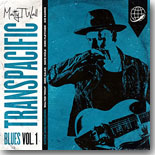 Matty T. Wall’s latest
effort, Transpacific Blues Vol. 1 (Hipsterdumpster
Records) is a firecracker of an album featuring
the Australian guitarist’s take on eight blues
classics. Wall and his band (Rick Whittle –
drums, Stephen Walker – bass) are joined by five
equally formidable guest guitarists from across
the globe --- Dave Hole, Eric Gales, Kid Ramos,
Walter Trout, and Kirk Fletcher. If that lineup
doesn’t get blues fans hopping, then the
paramedics need to be called in.
Matty T. Wall’s latest
effort, Transpacific Blues Vol. 1 (Hipsterdumpster
Records) is a firecracker of an album featuring
the Australian guitarist’s take on eight blues
classics. Wall and his band (Rick Whittle –
drums, Stephen Walker – bass) are joined by five
equally formidable guest guitarists from across
the globe --- Dave Hole, Eric Gales, Kid Ramos,
Walter Trout, and Kirk Fletcher. If that lineup
doesn’t get blues fans hopping, then the
paramedics need to be called in.
Wall and Hole join forces for
the jet-fueled opener, John Lee Hooker’s “Boom
Boom,” with Wall trading licks with Hole’s
always-inspiring slide guitar, definitely a
wonderful way to start this great album. Wall
trades licks with Gales on a tasty, funky read
of “Hi Heel Sneakers” that probably left jaws
agape in the studio.
Next, Wall and Ramos blow Albert
Collins’ “Quicksand” out of the water with a
hard-rocking shuffle treatment, followed by a
cool cover of Muddy Waters’ “She’s Into
Something” that hews closely to Robert Cray’s
mid-’80s treatment on the legendary Showdown!
album. Trout joins Wall on this superlative
effort.
Wall slows things down for a
marvelous remake of “Stormy Monday,” that
simmers and stews for over six minutes and
simply sounds like no other previous versions to
these ears. Fletcher joins Wall for a sizzling
“Born Under A Bad Sign,” and the pair nearly
blow the doors off the album with their
fretwork. The last two tracks feature Wall and
his band; Freddie King’s “I’m Tore Down,” a
thumping shuffle that features some of Wall’s
best guitar work, and Robert Johnson’s
“Crossroads,” which gets a grungy, rocking
treatment that works very well.
Matty T. Wall’s Transpacific
Blues Vol. 1 is one heck of a blues party,
albeit a short one at 35 minutes. That’s okay,
because we have Vol. 2 to look forward to,
hopefully very soon.
--- Graham Clarke
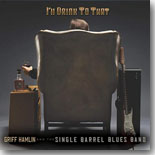 Griff Hamlin is a familiar name
for music fans who have enjoyed his Blues Guitar
Unleashed instructional website, which has
attracted over 30,000 followers on Facebook and
over 75,000 followers on YouTube. Hamlin hasn’t
toured or recorded in a number of years, but he
recently released I’ll Drink To That as
Griff Hamlin and the Single Barrel Blues Band.
This sparkling 10-song set features Hamlin
(guitar/vocals) backed by Ty Bailie (keyboards),
Mark Smith (bass), Chris Atchley (drums),
Jonathan Bradley (trumpet), Eric Letta (saxes),
Kevin Hicks (trombone), and Laura Hamlin
(baritone sax/percussion).
Griff Hamlin is a familiar name
for music fans who have enjoyed his Blues Guitar
Unleashed instructional website, which has
attracted over 30,000 followers on Facebook and
over 75,000 followers on YouTube. Hamlin hasn’t
toured or recorded in a number of years, but he
recently released I’ll Drink To That as
Griff Hamlin and the Single Barrel Blues Band.
This sparkling 10-song set features Hamlin
(guitar/vocals) backed by Ty Bailie (keyboards),
Mark Smith (bass), Chris Atchley (drums),
Jonathan Bradley (trumpet), Eric Letta (saxes),
Kevin Hicks (trombone), and Laura Hamlin
(baritone sax/percussion).
“Almost Level To The Ground,” a
muscular blues-rocker, opens the disc on a high
note. No surprise at Hamlin’s guitar chops, but
his vocals are on par with his fretwork. The
horn section is a plus on this track as well.
The thumping shuffle, “Same To You,” showcases
keyboardist Bailie, and “Down And Out” is a
rocking good time. “Someone” is a well-done
traditional slow-burning blues ballad, and the
catchy “Nothing Better” is an upbeat blues with
a touch of rock and pop, while the funky
“Louisiana Holiday” grooves to a tasty Second
Line rhythm.
“Don’t Lie” is a Texas-styled
roadhouse boogie with a creative nod to Stevie
Ray Vaughan and Double Trouble. It’s followed by
“Where Would I Begin,” a nicely-paced love
ballad with a fine vocal from Hamlin. “Got To
End” is a solid, mid-tempo rocker and provides a
nice segue into the closer, “Bourbon And A
Pistol,” which has a cool ’50s R&B feel, letting
the band stretch out a bit before wrapping up.
Griff Hamlin provides a boatload
of impressive guitar work and vocals on this
winning set, and he couldn’t ask for better
support from the Single Barrel Blues Band. Any
blues fans who like their tunes on the rock side
of the aisle will want to grab I’ll Drink To
That.
--- Graham Clarke
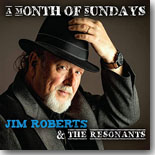 Singer/songwriter/guitarist
Jim Roberts, backed by The Resonants,
dazzle with his latest release, A Month Of
Sundays. A superb slide guitarist, Roberts
(vocals/slide and cigar box guitars/mandolin)
has cranked out two excellent releases in recent
years, and this one makes three. The Resonants,
a stellar set of L.A. studio musicians, include
Rick Hollander (bass/mandolin/banjulele), Mike
Harvey (drums/percussion), Michael Leasure
(drums/percussion), Grant Cihlar (slide guitar),
Joey Gomez (harmonica), Bobby Spencer (tenor
sax), and Pat Zicari (tenor and alto saxes).
Singer/songwriter/guitarist
Jim Roberts, backed by The Resonants,
dazzle with his latest release, A Month Of
Sundays. A superb slide guitarist, Roberts
(vocals/slide and cigar box guitars/mandolin)
has cranked out two excellent releases in recent
years, and this one makes three. The Resonants,
a stellar set of L.A. studio musicians, include
Rick Hollander (bass/mandolin/banjulele), Mike
Harvey (drums/percussion), Michael Leasure
(drums/percussion), Grant Cihlar (slide guitar),
Joey Gomez (harmonica), Bobby Spencer (tenor
sax), and Pat Zicari (tenor and alto saxes).
Roberts wrote or co-wrote (with
Hollander or Cihlar) all 12 tracks, which run
the gamut from blues to southern rock to
Americana. The southern rock sounds arrive
immediately with the funky, horn-fueled “Skeeters,”
before venturing into the Mississippi Delta with
the acoustic “What Her Evil Do.” Meanwhile,
“Belle Of The Ball” has a country feel and
Roberts lays down some splendid slide guitar,
and the title track is smoky blues with a touch
of jazz, while “Made A Promise” is a nice slow
burner with a hint of old school pop in the
lyrics.
“Long Haired Mississippi Hippie”
reminded me of the brave new blues of the North
Mississippi Allstars, and definitely in a good
way. Definitely an album highlight. The moody
“Miss Her Love” is another highlight, Roberts’
guitar work gives this one a haunting shimmer,
and his slide guitar is pristine on the rocker
“Pay The Price.” The droning “Moonshine Maiden”
mixes the Delta with the swamp with satisfying
results, and on “Miss Motor City 1963,” Roberts
fondly remembers the days of his youth via a
tale of unrequited love (with a calendar girl on
his father’s wall).
“I’m Walkin’ On” has a little of
everything --- funk, jazz, blues..Hollander’s
bass line is superb, and this one really cooks.
The album closer, “Steppin’ Out,” is a cool
acoustic romp with slide from Roberts and
banjolele from Hollander that’s just not long
enough.
Listeners can always depend on a
fine, high quality set of blues and roots music
from Jim Roberts and The Resonants, and A
Month Of Sundays certainly doesn’t
disappoint.
--- Graham Clarke
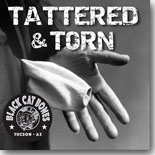 Formed in 2004, the Tucson-based
band Black Cat Bones boasts a robust
blues, rock, and soul attack fronted by singer
Charles Pitts with superlative backing from
bassist/vocalist/guitarist Jeff Daniels,
guitarists Richard Rivera and Gary David, and
drummer Jerry Sommers. Over their 16 year
history, they have played many festivals, clubs
and other venues throughout the southwestern
U.S. and the east coast, developing a nice
following with their soulful vocals and twin
guitar work. Their fourth album, Tattered &
Torn, features a dozen tracks, all originals
penned by various band members.
Formed in 2004, the Tucson-based
band Black Cat Bones boasts a robust
blues, rock, and soul attack fronted by singer
Charles Pitts with superlative backing from
bassist/vocalist/guitarist Jeff Daniels,
guitarists Richard Rivera and Gary David, and
drummer Jerry Sommers. Over their 16 year
history, they have played many festivals, clubs
and other venues throughout the southwestern
U.S. and the east coast, developing a nice
following with their soulful vocals and twin
guitar work. Their fourth album, Tattered &
Torn, features a dozen tracks, all originals
penned by various band members.
The opener, “Manslaughter,” is
greasy blues rock that harkens back to the
genre’s earliest days, and “When I Get That
Feeling,” strikes a slinky, seductive R&B
groove. The churning “Dead Broke Blues” rocks
hard but retains its blues flavor, and “The
Race” is a smooth slow blues that incorporates
horns (Clay Brown and Amochip Dabney –sax, Carla
Brownlee – baritone sax). “Led To Believe” is a
mid-tempo, radio-ready track that should be a
crowd pleaser, and “Lowdown” is a catchy rocker
straight out of the roadhouse.
“Lone Lobo” is a pleasing ’70s
rock-flavored ballad, and “Pay You Back With
Interest” and “Just Around The Corners both keep
that vibe rolling, albeit at more of a mid-tempo
rhythm. “Laying In Wait” has a bit of a swampy
vibe to it with the shimmering guitar work and
laidback feel. I like the Windy City groove that
drives “Not So Funny,” and the closer, “I Don’t
Care,” reminded me a lot of the early ’70s
Rolling Stones acoustic/country days, with very
soulful vocals from Pitts and Daniels. They
definitely saved the best for last with this
track.
Tattered & Torn is a
rock- solid blues release with emphasis on
“rock.” Black Cat Bones sounds great, operating
like a well-oiled machine from top to bottom,
and Pitts’ vocals are first-rate throughout.
This strong set will definitely please the blues
rocker in your household.
--- Graham Clarke
 Croatian harp master Tomislav
Goluban paid tribute to the blues of the
Windy City with his 2019 effort, Chicago
Rambler. This time around he moves south for
Memphis Light (Spona Records). There’s no
better way to pay tribute to the Bluff City than
to enlist some of the finest musicians from the
area --- Jeff Jensen (guitar), Mark Johnson
(slide guitar), Rick Steff (keys), Bill Ruffino
(bass) and special guests Vince Johnson
(harmonica/vocals) and backing vocalists Joseph
Franher, Daunielle Hill, and Reba Russell.
Goluban wrote nine of the ten tracks for this
most impressive set.
Croatian harp master Tomislav
Goluban paid tribute to the blues of the
Windy City with his 2019 effort, Chicago
Rambler. This time around he moves south for
Memphis Light (Spona Records). There’s no
better way to pay tribute to the Bluff City than
to enlist some of the finest musicians from the
area --- Jeff Jensen (guitar), Mark Johnson
(slide guitar), Rick Steff (keys), Bill Ruffino
(bass) and special guests Vince Johnson
(harmonica/vocals) and backing vocalists Joseph
Franher, Daunielle Hill, and Reba Russell.
Goluban wrote nine of the ten tracks for this
most impressive set.
The churning North
Mississippi-charged “Hayloft Blues” opens the
disc on a positive note. Next is “Fun Starts
Here,” a cool slow burner that drips soul thanks
to guest Vince Johnson, who contributes lead
vocals, and guitarist Jensen. “Country Bag” is a
rollicking instrumental shuffle that developed
during a studio jam, and “Disappear For Good” is
a moody rhumba with a touch of jazz that deals
with the fear of losing a loved one. On the
bittersweet title track, Goluban narrates a
tribute to the city while lamenting the loss of
a friend whose last wish was to visit Memphis.
The album’s lone cover is The
Animals’ “House of the Rising Sun,” taken at a
brisker, shuffling pace. Goluban’s laconic vocal
and Mark Johnson’s slide guitar work make this
version really pop. Meanwhile, the upbeat
“Spirit Will Never Get Old” is a tribute to
Goluban’s late grandfather, and the lighthearted
“Party Time Blues” describes a wild and fun time
and the day after that’s less so. On the urban
blues “Woman Needs A Man,” Vince Johnson joins
in on vocals once again, and the buoyant closer,
“Can I Be What I Want,” describes the
complicated nature of relationships.
Tomislav Goluban is a first-rate
songwriter and performer --- a fine harmonica
player, for sure. Memphis Light is a good
reflection of his talents and his super backing
band. A fun set of blues to kick back and relax
with.
--- Graham Clarke
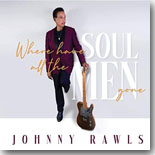 I've
been a big fan of Johnny Rawls ever since
I first saw him at a club in Phoenix about 20
years ago. The man is one of the best soulful
blues singers around. That's why I was a little
disappointed with his previous album, as I
thought the production was somewhat overdone and
didn't sound real. Thus, I was apprehensive when
his latest disc, Where Have All The Soul Men
Gone (Third Street Cigar Records), arrived
in my mailbox.
I've
been a big fan of Johnny Rawls ever since
I first saw him at a club in Phoenix about 20
years ago. The man is one of the best soulful
blues singers around. That's why I was a little
disappointed with his previous album, as I
thought the production was somewhat overdone and
didn't sound real. Thus, I was apprehensive when
his latest disc, Where Have All The Soul Men
Gone (Third Street Cigar Records), arrived
in my mailbox.
Turns out my fears were ungrounded
because his latest album of ten cuts is quite
fine, a perfect representation of the soul/blues
genre. Recorded in Denmark with a band
consisting of some of that country's best studio
musicians, the album got its final mix at
Bigfoot Studios in Waterville, Ohio. Most
importantly, The Waterville Horns (Travis Geiman
- trombone, Mike Williams - alto sax) provided
the icing on the cake with their accompaniment
added to the recordings. Quite frankly, the
addition of the horn section is what pushes this
album over the top.
Rawls has consistently straddled
that line between soul and blues. As the album
title would indicate, the music here tilts
heavily to the soul side. Opening is the title
cut, a mid-tempo tune on which Rawls mentions
the soul men of the past who have left us,
especially his biggest influences in O.V. Wright
and Otis Clay. Rawls has also been heavily
influenced by gospel music, and while "Bottom To
The Top" is from the secular side, it's a song
that carries a big inspirational vibe.
I mentioned that the addition of
the horn section made a good album even better,
especially Geiman's trombone playing. He
especially carries the load on the soulful
"Can't Leave It Alone" (also very nice piano
from Alberto Marsico) on the slow blues, "Time." Geiman also provides the intro to the mid-tempo
blues shuffle, "Money," and the rollicking soul
number, "Town Too Small." Quite frankly, it
wouldn't have been out of place for Geiman to
get second billing behind Rawls. He's that good.
Kenan Özdemir provides a strong
guitar intro and a hot solo to the mid-tempo
blues, "Baby, Baby, Baby," while Marsico just
plan tears it up on the gospel stomper, "Calling
On Jesus," with Rawls and the backing singers
taking this one all the way down to the
riverside. This last cut is a great way to end
the album, likely leaving the listener with a
good, good feeling.
Keep recording, Johnny Rawls. We
love your music and your perpetual smile. Thank
you, sir, for Where Have All The Soul Men
Gone.
--- Bill Mitchell
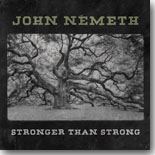 If
there's one pertinent statement to make about
the music of singer/harmonica ace John Németh
is that the cat is not afraid to go outside his
comfort zone.
He's done straight blues, soul and R&B, also
blending in hip hop on one album. With a new
band in tow (Jon Hay - guitar, Danny Banks -
drums, Matt Wilson - bass), Németh heads into
southern swamp territory on his newest disc,
Stronger Than Strong (Nola Blue Records).
The dozen cuts were recorded in Memphis under
the production of Scott Bomar, and with more
stripped down accompaniment it's a different
direction from where he's taken his music on
past recordings.
If
there's one pertinent statement to make about
the music of singer/harmonica ace John Németh
is that the cat is not afraid to go outside his
comfort zone.
He's done straight blues, soul and R&B, also
blending in hip hop on one album. With a new
band in tow (Jon Hay - guitar, Danny Banks -
drums, Matt Wilson - bass), Németh heads into
southern swamp territory on his newest disc,
Stronger Than Strong (Nola Blue Records).
The dozen cuts were recorded in Memphis under
the production of Scott Bomar, and with more
stripped down accompaniment it's a different
direction from where he's taken his music on
past recordings.
Opening this set of music is a
mid-tempo country blues, "Come and Take It,"
with echo-y vocals from Németh and rhythmic
guitar work from Hay. Bomar's mix gives
"Fountain of a Man" a muddier, Hill Country
sound as Németh comes in with a solid harmonica
intro. alternating lines with his vocals. Hays
gets to turn loose with a smokin' guitar solo,
and on the up-tempo rocker, "Throw Me In The
Water," he really puts down some hot licks.
If there's one thing this
album accomplishes, it introduces the
teen-aged Hays to a wider audience, especially
blues guitar fans. His guitar solo on the
mid-tempo blues shuffle, "Chain Breaker," may be
the highlight of this disc. The dude's on fire
here, as he also is with his playing on the slow number "Bars,"
on which Németh sings about all kinds of bars
for
some of his best vocal work --- "... Bars on the
window to keep us safe, bars on the corner to
help us erase, bars on the door until we do our
time, stars and bars occupy our mind ..."
"I Can See Your Love Light
Shine" is an up-tempo feelgood song with gospel
overtones and a strong bass backbeat. Németh
plays some of his best harmonica on the slow,
funky blues, "Work for Love," spending more of
his time on the higher notes. The band pays
tribute to singer Jesse Belvin, covering his
song "Guess Who," a slow ballad that goes on
just a little too long for my tastes.
The best was saved for last,
with the rollicking "Sweep the Shack" closing
the album. It's been injected with a dose of
soul, especially with the guitar work of Hays.
This one's got more energy than all of the
preceding cuts, leaving us with a blast of
adrenaline to finish the day.
It took me a couple of listens
to really get into this album, but I got there.
I'm impressed with Németh's musical versatility.
He continues to intrigue with Stronger Than
Strong.
--- Bill Mitchell
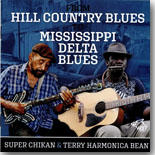 A couple of Wolf Records associates made the
trek from Austria to Mississippi two years ago
looking to record the best Mississippi Delta
musicians they could track down. They couldn't
have found a better pair than guitarist Super
Chikan and guitarist/harmonica player
Terry "Harmonica" Bean, and lined them up to
record individually, resulting in the album,
From Hill Country Blues To Mississippi Delta
Blues (Wolf Records). The performances and
the song selection by both artists are all
great.
A couple of Wolf Records associates made the
trek from Austria to Mississippi two years ago
looking to record the best Mississippi Delta
musicians they could track down. They couldn't
have found a better pair than guitarist Super
Chikan and guitarist/harmonica player
Terry "Harmonica" Bean, and lined them up to
record individually, resulting in the album,
From Hill Country Blues To Mississippi Delta
Blues (Wolf Records). The performances and
the song selection by both artists are all
great.
Just one problem, however. The
recordings apparently were not made in a studio,
but regardless this is the 21st century and the
technology exists to make these recordings sound
just fine. Instead, the mix is often just not good,
especially on Bean's vocals that are sometimes
mixed too high and sometimes too low, and many
of the songs lack warmth. I should be raving
about this album because of the raw Delta music
coming from both performers, but instead I feel
like I'm missing what could have been an
award-winning set of music.
The Super Chikan songs come
across best, even the opening cut, "Tin Top Shak,"
with the Chikan playing some mean slide on his
handmade guitar. His vocals are mixed too low
but his guitar playing is still worth hearing.
Another very fine number by Super Chikan, this
one with better sound quality, is "'Sippi Seekan'
Saw," an up-tempo blues with really nice
slide work. Chikan merges his thoughts about
life in Mississippi, Tennessee and Arkansas into
one state of mind. I can tell that the numbers by
Bean are prime examples of Hill Country Blues,
but every song is marred by a bad mix.
Like I said, there's plenty of
good music on this album's 15 cuts. Whether you
will be satisfied with the quality of the
recordings remains to be seen. These gentlemen
deserved better.
--- Bill Mitchell
 Somebody Else (Pink Lane)
is the follow-up single to the critically
acclaimed debut, Sink Or Swim, rising UK
star Ruth Patterson once again pushing
the boundaries of her exceptional musicianship
and songwriting acumen whilst unveiling her
skills as a visual artist. On first listening,
“Somebody Else,” with its mournful piano
introduction appears to be a song in the blues
tradition about love followed by betrayal and
loss but more complex layers of meaning become
increasingly evident. Patterson’s mastery of
surrealistic imagery is reminiscent of early
Dylan, her lyrical reflections evocative of Joni
Mitchell’s reworking of folklore.
Somebody Else (Pink Lane)
is the follow-up single to the critically
acclaimed debut, Sink Or Swim, rising UK
star Ruth Patterson once again pushing
the boundaries of her exceptional musicianship
and songwriting acumen whilst unveiling her
skills as a visual artist. On first listening,
“Somebody Else,” with its mournful piano
introduction appears to be a song in the blues
tradition about love followed by betrayal and
loss but more complex layers of meaning become
increasingly evident. Patterson’s mastery of
surrealistic imagery is reminiscent of early
Dylan, her lyrical reflections evocative of Joni
Mitchell’s reworking of folklore.
As Ruth explains: “In one sense
the song could be about a breaking relationship
but on a personal level, as someone happily
married, it became more about my identity as a
performer. My relationship with art and audience
can feel like a stormy love affair. Touring with
my band, Holy Moly & The Crackers, was a real
whirlwind. It was great! But sometimes it felt
like I was losing a sense of who I was and what
I wanted to say. My identity as a performer was
consuming my sense of individuality. I think
it's why a lot of artists struggle with mental
health. It can eat you up until there’s nothing
left. I guess that’s what the chorus line “we
flew so high that the fire went out” means to
me. “
From the first verse, the
sumptuous ascending acoustic strings of the
Harborough Collective quartet complement Ruth’s
introspective, almost trembling vocals as she
sings, “... Like a ghost after death climbing
out of his skin, Is a soul in flight such a
terrible thing? ...,” highlighting an intriguing
song that questions more than it answers. After
these introductory diaphanous tones, the mood
changes in the soaring, heart-breaking chorus,
Patterson’s determination, acceptance and
strength reflected in her incredible vocal range
and versatility. A clever stylistic device is
breaking the barrier between herself and the
listener by addressing her audience directly and
revealing the truth in her inimitable highly
personal way.
The accompanying music video directed by Ruth
indeed portrays a metamorphosing artist showing
both her vulnerability and self-assurance, at
ease with where she is and confident enough to
convey her emotions with complete honesty and
integrity. A strong symbiosis exists between the
visual and lyrical imagery which reinforces the
meaning. Check Ms. Patterson's
website or
YouTube for more info.
--- Dave Scott